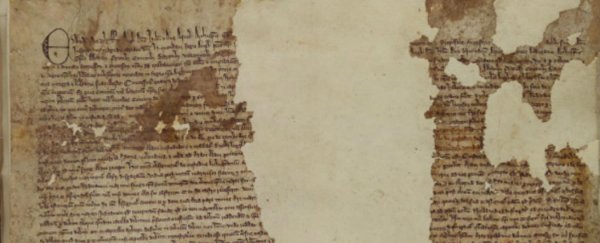On 15 June 1215, King John of England signed a charter that would come to be known as the Magna Carta. Drafted by the Archbishop of Canterbury, this document was an agreement to limit the rights of kings, and make peace between the royal family and a group of rebel barons over taxation laws.
Since it was first signed, the Magna Carta was re-issued several times up until 1300, when King Edward I - King John's grandson - released the final version. Researchers say just seven originals have been found of this 1300 edition, one of which has just been discovered in a scrapbook in Kent, a county in southeast England.
"Nobody knew it was there," Sophie Ambler, a research associate with the Magna Carta Project, told Stephanie Pappas from Live Science. "This Magna Carta had been stuck into a scrapbook by a Victorian official from the British Museum at the end of the 19th century."
The team says the scrapbook had been moved from the British Museum to the Sandwich archive in Kent at some point during the 19th century, before being forgotten. Sandwich, which still has a population of just under 5,000 today, is a small town in Kent with a history dating back to at least 1028, when ferries would transport monks across the river at the behest of King Canute.
Th document was rediscovered by the Magna Carta Project team as they were investigating the history of the iconic document in preparation for its 800th anniversary later this year. In the process of looking up the Charter of the Forest - a smaller, complementary document of the same time period, housed in Kent - an historian discovered the 1300 copy.
At around half a metre long, the document is impressive, but tattered, water-damaged and has one-third of the text and the royal seal missing. But the most important part - the date - remains visible on the bottom. The document was authenticated by matching the layout, handwriting and text to what archaeologists know of the 1300 versions of the Magna Carta.
Pappas reports that other than the excitement of finding such a unique piece of British history, the discovery is significant because it shows that copies of the Magna Carta were distributed more widely than we thought. "Sandwich was what is known as a 'Cinque Port,' a coastal town given exemptions from certain taxes and oversight in return for maintaining ships for the kingdom's defence needs," she writes for Live Science.
"The fact that we had one [delivered] to the Cinque ports adds a whole other audience [for the Magna Carta]", Ambler told her.
The Magna Carta underpins much of the justice system we've grown accustomed to today, says the BBC, including the stipulation that no one is above the law - including the King - and everyone has the right to a fair trial. It inspired the creation of several other historic documents, including the US Constitution and the Universal Declaration of Human Rights.
It's not clear what will happen to the document now, but Ambler says it will probably stay where it is in Kent. Right now, it's available for viewing at the Kent History and Library Centre in Maidstone. "Through the American Declaration of Independence, continuing in the Universal Declaration of Human Rights, Magna Carta still underpins individual liberties worldwide," Paul Graeme, mayor of Sandwich Town Council, told the press. "To own such a document - and the Charter of the Forest - is an honour and a great responsibility."
Sources: Live Science, BBC News
